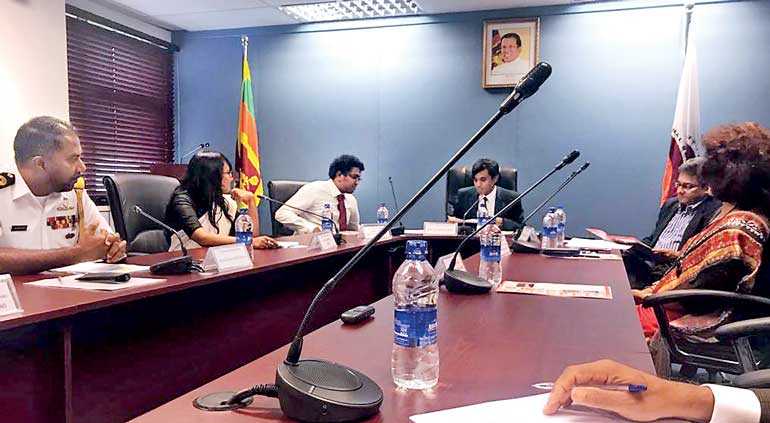Saturday Feb 21, 2026
Saturday Feb 21, 2026
Tuesday, 25 September 2018 00:00 - - {{hitsCtrl.values.hits}}


The Institute of National Security Studies Sri Lanka on 20 September, conducted a round table discussion on “Sri Lanka’s Role in the BIMSTEC”. The panellists were Kithmina Hewage, Research Officer at the Institute of Policy Studies of Sri Lanka, Rohan Masakorala, CEO of Shippers’ Academy Colombo, Prof. Hemanthi Ranasinghe, Dean of faculty of Graduate Studies University of Sri Jayewardenepura, Commodore Sanjeewa Dias, Director of Naval Operations and Natasha Fernando, Research Assistant at INSSSL.
The discussion was moderated by Director General INSSSL, Asanga Abeyagoonasekera and graced by the presence of the Chulamanee Chartsuwan, the Ambassador of Royal Thai Embassy to Sri Lanka and M. Riaz Hamidullah, the High Commissioner of Bangladesh High Commission to Sri Lanka and other interested participants.
The Chair of the panel Director General Asanga Abeyagoonasekera highlighted the importance of Sri Lankan President Maithripala Sirisena receiving the Chair of the BIMSTEC this year in Nepal and said, “This is a golden opportunity for Sri Lanka to work towards strengthening multilateralism in this region which is one of the least integrated regions of the world. BIMSTEC is no longer purely seen as a development forum due to its security agenda, think tanks such as INSSSL has a big role to play.”
Hewage highlighted that Sri Lanka as the Chair of BIMSTEC, should go forward in opening trade avenues, in being economically proactive in the region. He brought out the importance of Bilateral Agreements as opposed to the FTA currently proposed by BIMSTEC. He explained that BIMSTEC creates the platform in making value chains which Sri Lanka has failed to plug into and it could be sought after as a replacement for SAARC in creating trade relations. In the process of building trade relations, RCEP or Regional Comprehensive Economic Partnership was mentioned as a positive coalition and a developing countries’ response to TPP. He concluded his remarks adding a sceptical note on BIMSTEC, particularly on its FTA which has been in process of negotiation since 2004, yet has not been concluded or executed.
Natasha, as the second panellist, brought “security cooperation through BIMSTEC” into discussion. Through her presentation, she analysed BIMSTEC as a sub-regional organisation, regional security cooperation, its role in countering terrorism and transnational crime sector. She highlighted the significance of intelligence sharing among the members of BIMSTEC in addressing the security issues of the region such as terrorism and transitional crimes. She further proposed the need for an authoritative, legal institution from within BIMSTEC, listing comprehensive specifications in sharing intelligence.
Commodore Sanjeewa Dias, focusing on marine security, explained the increased occurrence of non-traditional security threats such as, maritime terrorism, piracy, Illegal migration, Illegal, unreported and unregulated fishing, trafficking of narcotics, marine pollution in the region that has affected maritime security. He also added the risks of weapon smuggling and the dangers of hybrid threats (ships are used as bombs) that can affect not only the seas but also the shores, and hence even pose a threat to tourism industry of the country. Hence he highlighted the need to consider maritime security as a top priority in BIMSTEC.
Natasha from NISSSL and Commodore Sanjeewa Dias from Sri Lanka Navy, both emphasised the importance of intelligence sharing in controlling and mitigating the traditional and non-traditional security threats to the region. And further proposed the establishment of an infusion centre in Sri Lanka enabling intelligence sharing among the members of the BIMSTEC.
Prof. Hemanthi Ranasinghe emphasised the significance of the environmental sector in ensuring the security and sustainable development of the region. She proposed linking of the three concepts of BIMSTEC, SDG’s and environment together to engage in collaborative exercises in achieving development. In realising sustainable development, BIMSTEC can contribute by enabling technological transfer, formulating common policies across borders, assistance in disaster situations and in overcoming common development challenges. As a region with common environmental issues such as deforestation and land degradation, she stressed the importance of collaboration and cooperation in realising and alleviation of these issues.
Rohan Masakorala, engaged in bringing the areas of shipping and connectivity into the discussion. He described this era to be the “Asian century” and emphasised that Sri Lanka has not yet become successful in joining the development process along with other Asian countries such as South Korea, Singapore and India. He presented the prevailing nature of protectionism as the main reason holding back Sri Lanka from becoming a shipping hub in the region. Hence he stressed the need to open up the country to create trade relations, attract investors in the long run of becoming a transshipment location. Chinese presence in Hambantota port was explained as threat and in competing with a major power such as China to control the ports and shipping industry of the country, Colombo Port faces a grave challenge. Hence in balancing the Chinese influence, and also with only a small market (of 20 million) in the country, it is necessary to maintain and build connections with neighbouring countries especially with India and to balance Bay of Bengal. In balancing Bay of Bengal, he projected the increasing value of Trincomalee port hence stressed the need to keep it in possession of the country in becoming a regional player in BIMSTEC region which will also ensure the national security of Sri Lanka.